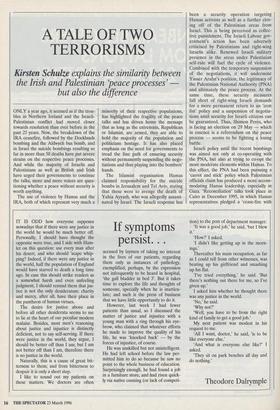A TALE OF TWO TERRORISMS
Kirsten Schulze explains the similarity between the Irish and Palestinian 'peace processes'
but also the difference
ONLY a year ago, it seemed as if the trou- bles in Northern Ireland and the Israeli- Palestinian conflict had moved closer towards resolution than ever before in the past 25 years. Now, the breakdown of the IRA ceasefire, followed by the Docklands bombing and the Aldwych bus bomb, and in Israel the suicide bombings resulting so far in more than 50 deaths have put severe strains on the respective peace processes. And while the majority of Israelis and Palestinians as well as British and Irish have urged their governments to continue the talks, more and more voices are ques- tioning whether a peace without security is worth anything.
The use of violence by Hamas and the IRA, both of which represent very much a minority of their respective populations, has highlighted the fragility of the peace talks and has driven home the message that as long as the extremists, Republican or Islamist, are armed, they are able to hold the majority of the population and politicians hostage. It has also placed emphasis on the need for governments to tread the fine path of ensuring security without permanently suspending the nego- tiations and thus playing into the bombers' hands.
The Islamist organisation Hamas claimed responsibility for the suicide bombs in Jerusalem and Tel Aviv, stating that these were to avenge the death of Yahia Ayyash, who was allegedly assassi- nated by Israel. The Israeli response has been a security operation targeting Hamas activists as well as a further clos- ing off of the Palestinian areas from Israel. This is being perceived as collec- tive punishment. The Israeli Labour gov- ernment's action has been adversely criticised by Palestinians and right-wing Israelis alike. Renewed Israeli military presence in the areas under Palestinian self-rule will fuel the cycle of violence. Combined with the temporary suspension of the negotiations, it will undermine Yasser Arafat's position, the legitimacy of the Palestinian National Authority (PNA) and ultimately the peace process. At the same time, these security measures fall short of right-wing Israeli demands for a more permanent return to an 'iron fist' policy and a suspension of negotia- tions until security for Israeli citizens can be guaranteed. Thus, Shimon Peres, who is facing an election on 29 May — which in essence is a referendum on the peace process — seems to be fighting a losing battle.
Israeli policy until the recent bombings was aimed not only at co-operating with the PNA, but also at trying to co-opt the more moderate elements within Hamas. To this effect, the PNA had been pursuing a `carrot and stick' policy which Palestinian officials claim has produced a more accom- modating Hamas leadership, especially in Gaza. 'Reconciliation' talks took place in Cairo in December 1995, in which Hamas representatives pledged a 'cease-fire with the occupation'. Even after the assassina- tion of Ayyash, the dialogue between the PNA and the moderates in Hamas contin- ued, resulting in the statement that Hamas temporarily 'was ready to give up the armed struggle'. The combined Israeli and PNA strategy of co-opting the moderates seemed so successful that some observers — believing in the IRA's self-comparison with the PLO — suggested that had the British Government pursued a similar strategy in Northern Ireland, instead of insisting on decommissioning or elections, the IRA ceasefire would not have broken down.
The comparison, however, is faulty. If by co-option is meant the relationship between the Israeli government and the PLO, it should be emphasised that the PLO renounced violence in 1988 and recognised Israel's right to exist prior to negotiations. The IRA did not pledge a permanent cessation of violence in 1994, nor has it ever acknowledged Northern Ireland's right to exist within the Union. Then, maybe, the IRA should be com- pared with the more militant Hamas, in the sense that both represent only a minority of the population and both are pursuing exclusionist aims through politi- cal violence. In that case, the British Government with the SDLP has, through Sinn Fein, tried to include the Republi- can hardliners just as the Israelis, with the PNA, had negotiated with Hamas `moderates' to influence Islamist extrem- ists. But it should be pointed out that co- option did not mean a partnership on an equal level. Throughout negotiations, Palestinian as well as nationalist aspira- tions have often been subordinated to security concerns and government considerations of domestic or (in the case of Ireland) unionist opposition. Thus, in fact, the Israeli government's policy towards Hamas was not unlike British policy towards the IRA.
However, in both cases co-option was contingent upon the moderates in the political wing being able to influence the hardliners in the military wing. As the recent atrocities in Israel have shown, some Hamas activists were clearly not ready for a cessation of violence. That revealed the limits of Israel's policy. The breakdown of the IRA ceasefire has shown similar weaknesses. The question is whether governments have an alterna- tive. Increased security measures, while necessary, will undermine the PNA and its supporters in the Israeli case, as they have served to destroy nationalist confidence in the British Government. Suspending negotiations, while appeas- ing many Israelis and unionists, will alienate Palestinian and nationalist mod- erates, and at the same time play into the hands of the extremists. Possible concessions by the governments to the bombers will send the message that vio- lence does work, without ensuring that the concessions will achieve tangible results from parties for whom a compro- mise is perceived as surrender. And, finally, ending the peace process will be victory for the minority dictating events through bombs.
Given the alternatives and taking into consideration that even an ending of nego- tiations will not mean an end to violence or indeed an improvement in the security situ- ation, both the Israeli government and the British Government can only continue to proceed with the slow, lengthy and some- times painful process of talks. More realis- tic expectations from the general population regarding the time frame and the results could help. Equally, a more democratic, though highly unlikely, approach by the extremists would improve the situation if they really wanted a negoti- ated peace. By resorting to violence, Republicans and Islamists have outma- noeuvred themselves; no matter how terri- ble the history of the conflict, terrorist attacks on civilians are unacceptable and have no place even within a legitimate armed struggle.
The author is lecturer in International History at the London School of Economics.



































































 Previous page
Previous page